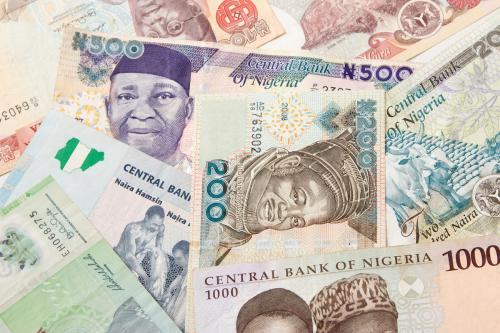This viewpoint is part of Foresight Africa 2024.
Factors external to Nigeria have long been important influences on policymaking and economic outcomes. Export revenues, diaspora transfers, foreign direct, and portfolio investments provide the principal channels through which global impulses are transmitted to Nigeria’s economy. As in many countries, a series of global events in recent years—ranging from the global financial crisis (2007-2009) through the COVID-19 pandemic and the more recent war in Ukraine—have left negative marks on the economy in Nigeria.
Macroeconomic stability is defined by the trio of economic conditions: output growth, at least, faster than the increase in population; the stability of prices—keeping devaluation and inflation below levels that adversely affect the economy; and adequate liquidity—positive current and capital account balances, growing foreign reserves, and a deep domestic financial system. Based on these, the economy in Nigeria has become increasingly illiquid, unstable, and stagnant since 2013/14. In other words, the impact of recent global headwinds has been to worsen both illiquidity and instability, rather being the cause. While the ongoing war in Ukraine created problems for Nigeria, however, as other nations, domestic policy responses were more detrimental.
While the ongoing war in Ukraine created problems for Nigeria, however, as other nations, domestic policy responses were more detrimental.
Two examples of poor policy choices come to mind—excessive growth in deficit financing and monetary repression. The sharp devaluation and rise in inflation—in my view, the largest contributory factors to economic instability—are largely the result of excessive money supply growth as the federal government aggressively borrowed from the Central Bank of Nigeria. Furthermore, the attempt to sterilize the effect of liquidity growth by imposing high reserve requirements on banks and administratively “defending” the external value of the Nigerian naira distorted financial markets, leading to negative inflation-adjusted yields and the erosion of confidence in the economy.
Removal of the subsidy on petrol was, from many perspectives, unavoidable. The Buhari Administration had been borrowing to maintain a subsidy regime which, being opaque and extending to fuel consumers beyond Nigeria, had long become unsustainable. Similarly, unification of exchange rates was inevitable as the market for foreign exchange had become a caricature—a badly distorted avenue for rentseeking. The new administration had no choice but to introduce these policies.
The argument of inevitability listed above is not to ignore the biting cost of reform—exacerbating an already bad cost of living crisis. It is important to note that these reforms have been long overdue and the delay in instituting them raised the associated adjustment costs and limited the room for maneuver.
In my view and notwithstanding being Chief Economic Adviser to President Muhammadu Buhari in the final eighteen months of the administration, the failure of domestic policymaking to understand markets and their imperatives is the standout lesson. Beyond this, the importance of taking advantage of opportunities when they present themselves cannot be ignored. In 2020, the opportunity to exit fuel subsidy, as crude oil prices collapsed to historic lows, was inexplicably spurned. While external headwinds for 2024 are already becoming clear, the primary challenge for economic policymaking in Nigeria will be to achieve stabilization of the economy; continue to implement meaningful reform—design, engagement with stakeholders, cost-efficient execution, and timely monitoring and review; and ensure that the cost of adjustment is borne by those most able while protecting the vulnerable.
The Brookings Institution is committed to quality, independence, and impact.
We are supported by a diverse array of funders. In line with our values and policies, each Brookings publication represents the sole views of its author(s).







Commentary
Managing global economic headwinds: Lessons from Nigeria’s policy responses
April 2, 2024